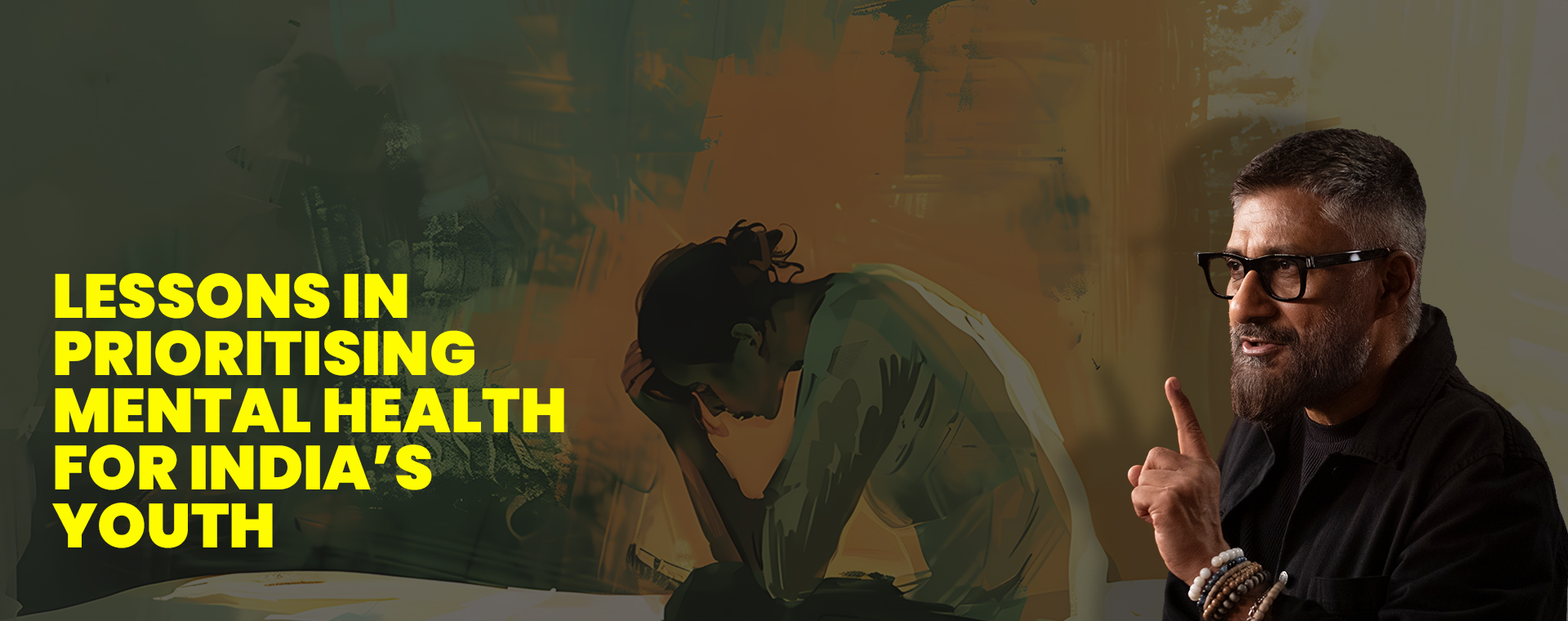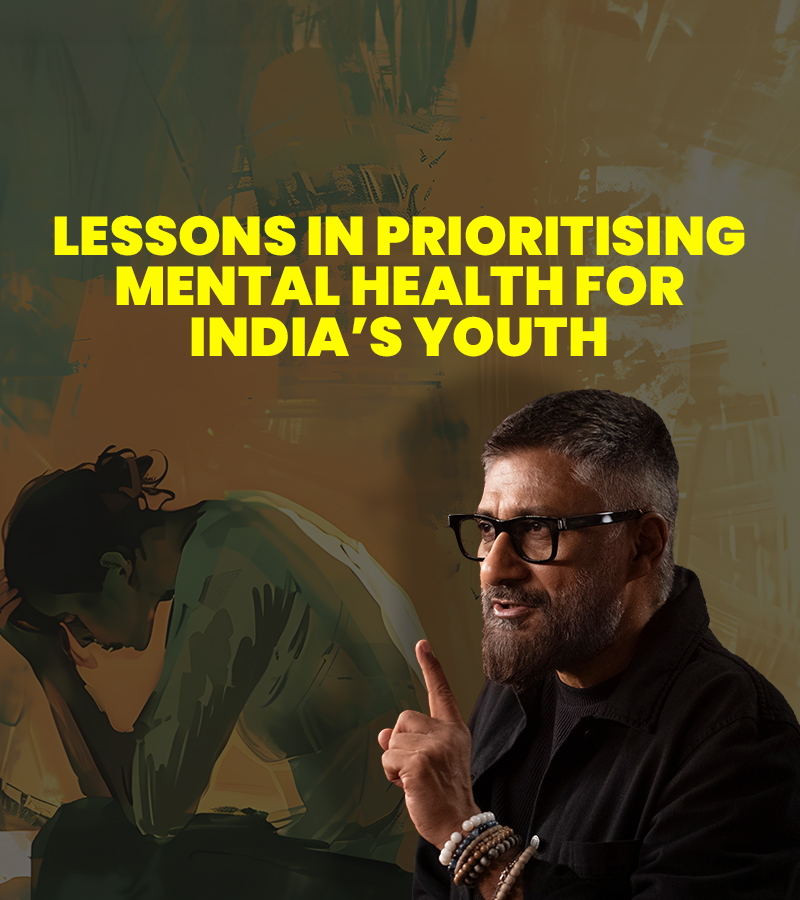

Are We Ignoring the Mental Health Crisis in India?
Vivek Agnihotri wants us to think more about India’s youth and growing mental health challenges.
Mental illness is not just a pressing global concern, it’s a crisis that demands our immediate attention. India, like many other countries, is grappling with this issue. Often shrouded in stigma and misunderstanding, mental health issues can have a devastating impact on individuals, families, and society as a whole. Are we ignoring the alarming rise of mental illness in India, particularly among our youth? Let’s find out!
A Critical Window: The Early Onset of Mental Illness
A significant statistic highlights the urgency of this issue: most mental illnesses first appear during childhood and adolescence. Studies by the National Institute of Mental Health and Neurosciences (NIMHANS) in Bangalore, India, reveal that:
- 50% of mental illnesses develop by the age of 14.
- 75% are established by the mid-20s.
This means that a crucial window exists for early intervention and support. It’s a beacon of hope in the midst of this crisis. Yet, a large number of young people in India struggle in silence, their mental health concerns going unnoticed or dismissed.
The Alarming State of Mental Health in India
The burden of mental illness in India is substantial. Here are some concerning figures:
- Nearly 14% of India’s adult population suffers from mental disorders, according to the National Mental Health Survey 2015-16.
- This translates to an estimated 60-70 million people in India dealing with common and severe mental health issues.
- Suicide is a significant consequence of untreated mental illness, with India having one of the highest suicide rates in the world.
These statistics paint a grim picture, highlighting the critical need for increased awareness and access to mental health services in India. It’s not just a need, it’s a pressing demand that we must address immediately.
Why Are We Ignoring Mental Illness?
There are several factors contributing to the neglect of mental health in India:
- Stigma: Mental illness is often shrouded in stigma and misunderstanding. People with mental health issues are frequently ostracized and labeled, leading them to suffer in silence.
- Lack of Awareness: There’s a general lack of awareness about mental health issues, their symptoms, and available treatment options. This prevents individuals and families from seeking help.
- Inadequate Resources: India faces a significant shortage of qualified mental health professionals and accessible mental health facilities.
The Ripple Effect of Untreated Mental Illness
Ignoring mental illness has severe consequences. Untreated mental health issues can lead to:
- Academic decline: Mental health issues can significantly impact a young person’s ability to learn and focus in school.
- Impaired relationships: Mental illness can strain relationships with family and friends.
- Substance abuse: Self-medication through drugs and alcohol is a common coping mechanism for untreated mental illness.
- Suicide: A tragic consequence of untreated mental illness, suicide can have a devastating impact on individuals, families, and communities.
A Case Study: The Silenced Struggles of Young Adults
Let’s consider the case of 18-year-old Rohan (name changed). Rohan has been experiencing anxiety and social isolation for months but hesitates to confide in anyone. The stigma surrounding mental illness in his community makes him fear judgment and social exclusion. Without proper support, Rohan’s symptoms worsen, impacting his academic performance and relationships. This fictional scenario, sadly, reflects the reality for many young people in India.
Beyond Statistics: The Human Cost of Untreated Mental Illness
The statistics paint a bleak picture, but the impact lies in the human stories. Untreated mental illness can rob individuals of their potential, joy, and even their lives. Imagine a young artist whose creativity is stifled by depression or a brilliant student whose academic dreams are shattered by anxiety. The human cost of ignoring mental health is immeasurable.
A Call to Action: Prioritizing Mental Health
The time for ignoring mental health is over. Here are some crucial steps towards addressing the crisis:
- Destigmatizing Mental Illness: Open and honest conversations about mental health are essential to break the stigma and encourage people to seek help. Media campaigns and educational programs can play a vital role in promoting understanding and empathy.
- Raising Awareness: Educational programs and campaigns can increase awareness about mental health issues, helping individuals identify and address them. Schools can incorporate mental health education into their curriculum, equipping students with knowledge and resources.
- Investing in Mental Health Services: Increased funding for mental health care is critical to creating a robust network of accessible mental health facilities and trained professionals. This includes expanding mental health services in rural areas, where access is particularly limited.
- Promoting Early Intervention: Early identification and intervention are crucial for successful treatment outcomes. Schools and communities can play a significant role in supporting young people’s mental well-being. Implementing mental health screenings in schools can help identify students struggling with mental illness and connect them with appropriate resources.
- Empowering Parents and Teachers: Parents and teachers need to be equipped with the knowledge and tools to recognize signs of mental illness in children and adolescents. Training programs can help them better understand mental health issues and provide practical support.
The Role of Technology in Bridging the Gap
Technology can play a vital role in addressing the mental health crisis in India. Telehealth services can provide remote access to mental health professionals, particularly in areas with limited resources. Additionally, online support groups and mental health resources can offer valuable information and a sense of community for individuals struggling with mental illness.
Vivek Agnihotri: A Voice for Mental Health Awareness
Vivek Agnihotri, a renowned filmmaker and author, has consistently used his platform to raise awareness about mental health. His work explores complex themes related to mental well-being, encouraging conversations and challenging societal norms surrounding mental illness. Agnihotri’s movies, books, and writing are a powerful reminder of the urgency of addressing this critical issue.
Conclusion: Building a Future Where Mental Health Matters
Addressing the mental health crisis in India requires a multi-pronged approach. By destigmatizing mental illness, raising awareness, increasing access to resources, and empowering communities, we can create a future where mental well-being is prioritized. Let’s break the silence, enable individuals to seek help, and nurture a culture of empathy and support. Together, we can ensure that no one struggles with mental illness in silence.
Taking the First Step: Resources and Support
If you or someone you know is struggling with mental illness, there are resources available to help. Here are some organizations providing mental health support in India:
- The National Institute of Mental Health and Neurosciences (NIMHANS)
- The 1Life helpline (toll-free): 134
- The AASRA helpline (toll-free): 91-22-27574666
- The iCall helpline (toll-free): 09223787888
Remember, seeking help is a sign of strength, not weakness. By taking the first step, you can journey towards healing and well-being.
Let’s work together to turn this wake-up call into a powerful movement for change. A movement where mental health matters and everyone has the opportunity to thrive.






